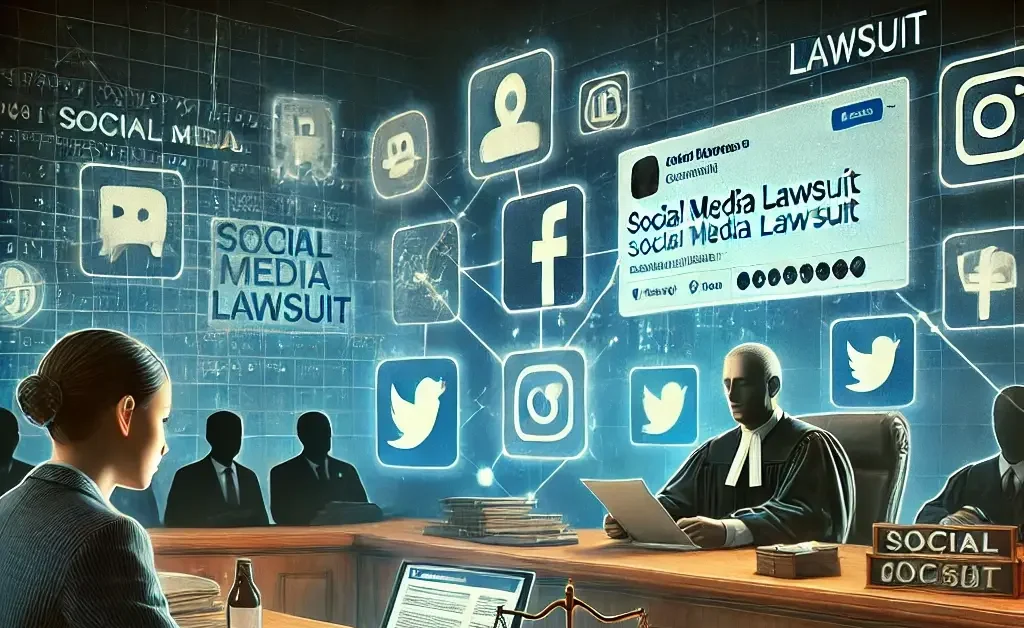Introduction: The Role of Social Media Lawsuits
Social media is a part of everyday life now, providing an arena to communicate ideas, befriend others, and market business. But as with all great power, harm can be wrought. From libel and cyberbullying to privacy invasion and intellectual property appropriation, social media can be the arena where litigation plays out.
A social media lawsuit occurs when an individual brings a legal action as a result of a violation or injury they suffered on social media. From an offensive comment, defamatory remarks, or invasion of privacy, social media lawsuits are becoming more prevalent in the digital era. Knowing how to propel a social media lawsuit can safeguard your rights and make justice prevail.
Common Causes of Social Media Lawsuits
Individuals frequently pursue legal action for the following typical social media issues:
- Defamation: Misstatements posted on social media may damage someone’s reputation, leading to claims of defamation. These include slander (oral) and libel (written) statements.
- Harassment and Cyberbullying: Repeated, offensive, or threatening communication online may lead to harassment lawsuits. This usually entails abusive messages, stalking, or cyberbullying.
- Invasion of Privacy: When someone posts private, confidential, or unauthorized pictures or details about you on social media, it can result in an invasion of privacy lawsuit.
- Intellectual Property Infringement: Use or distribution of your original work, such as images, videos, or music, on social media without authorization is a serious issue that could necessitate legal action.
Step-by-Step Process to Drive a Social Media Lawsuit
If you have been injured or wronged online, filing a lawsuit entails some very important steps. Here’s a detailed analysis of the process:
Step 1: Assemble Evidence
Evidence is fundamental to any lawsuit. For a social media case, begin by gathering any screenshots, direct messages, or posts that substantiate your claim. This evidence should clearly indicate the offending content and how it contravened your rights.
Also, maintain the URLs, timestamps, and any public interactions with regard to the incident. Storing this information in a secure way with tools such as Google Drive or Dropbox to avoid data loss is imperative.
Step 2: Seek Advice from a Legal Expert
Expert legal know-how is required when bringing a social media suit. Locate an attorney with special knowledge of internet law, defamation, privacy breaches, or anything else germane to your suit. An attorney will enable you to understand laws governing social networking sites, instruct you on the best way to present your claim, and analyze whether or not you have a good cause.
Because laws vary from one jurisdiction to another, particularly since social media websites are available across the globe, a lawyer will assist you in understanding such nuances. Your lawyer will also assist you in filing your lawsuit in the correct court.
Step 3: Identify the Defendant
The defendant in your lawsuit may be the person who made the defamatory post or shared your private information. It could also be the social media platform if they failed to address your concerns or enforce their own policies. Understanding who to file your case against will help streamline the process.
In instances of anonymous perpetrators, your attorney can assist in identifying them by subpoenaing the site or other legal means to locate the person responsible for the offensive content.
Step 4: File Your Lawsuit
After your evidence has been put together and you possess legal counsel, the second action is to legally file the case. This involves presenting court papers to the legal system, setting forth the harm you’ve suffered, the wrongdoer party, and relief or damages desired.
It’s important to note that social media lawsuits can be complicated due to issues like jurisdiction, international laws, and platform policies. Having an experienced lawyer will significantly increase your chances of success.
Step 5: Navigate the Legal Process
After your case is filed, the court will establish a hearing and motion schedule. Depending on the complexity and severity of your case, it can go to trial or the defendant may settle. Your attorney will guide you through every step of the legal process.
During this time, you can also be required to give further evidence or testimony. It’s important to stay involved with your attorney and inform him of any new developments or issues at this time.
Step 6: Enforce the Judgment
If you prevail in the case, the court will make a decision. This could be in the form of monetary damages or a court order to take down offending content. If the defendant refuses to comply, further legal action can be taken to enforce the ruling.
In certain instances, you could also be granted damages, including compensation for emotional distress or reputational damage resulting from the offending content.
Legal Considerations for Social Media Lawsuits
There are several legal issues to be taken into account while pursuing a lawsuit for social media:
- Defamation Laws: Defamation laws differ significantly from state to state or country to country. In certain jurisdictions, public figures are held to a higher standard in defamation cases, while private individuals are offered greater protection.
- Platform Responsibility: Social media platforms such as Facebook, Twitter, and Instagram have their own content moderation guidelines. Although platforms usually provide reporting mechanisms, they are not always responsible for the content shared by users. Nevertheless, in certain situations, such as negligence or inaction, platforms can be held responsible.
- Jurisdiction: Social media is international, and it can be difficult to determine the proper jurisdiction for your case. Your attorney will assist in determining where the case should be brought and which laws apply.
- Statute of Limitations: Various claims have varying time limits, referred to as statutes of limitations. Make sure to move fast if you are thinking about a social media lawsuit so that you do not lose important deadlines.
For additional information about legal issues with social media, go to this article from the American Bar Association. Do you know anything about Momentum Solar Lawsuit.
FAQs
Yes, a company can be sued if it doesn’t take down offending content or doesn’t live up to its own terms of service.
To prove harm in a defamation case, you must show that false statements were made about you, that the content was seen by others, and that it caused reputational or financial harm.
Yes, filing a lawsuit usually costs court fees, lawyer fees, and other related fees. Nevertheless, some attorneys provide contingency fees, whereby they are paid only if you succeed in the case.
In some cases, yes. If a site does not uphold its own standards or does not respond correctly to objectionable content, you may be able to sue.
Conclusion:
The emergence of social media has opened up new avenues for association, but has also introduced new issues in defending personal rights and images. If you’ve been hurt or defamed by another person’s activities online, learning how to power a social media lawsuit can make it possible for you to achieve justice. Through the steps explained, securing proper evidence, and with the guidance of a professional attorney, you can defend yourself and punish wrongdoers.







